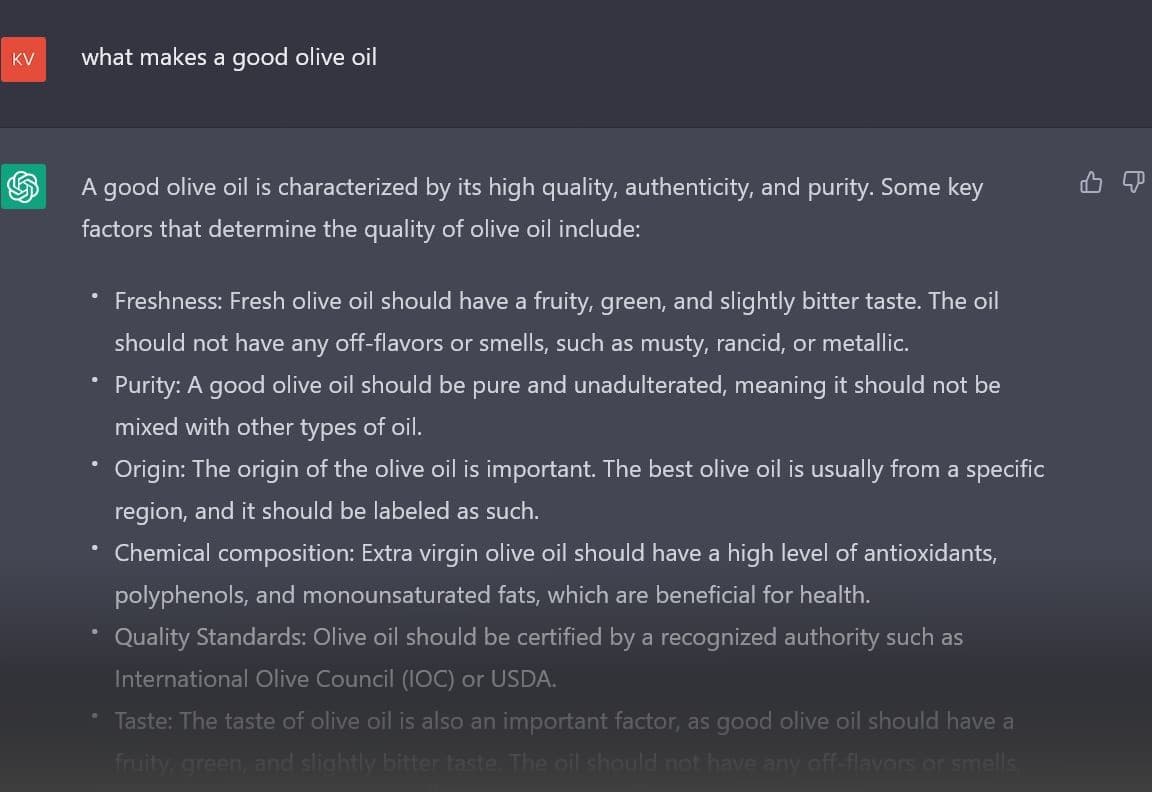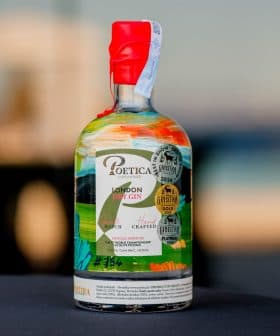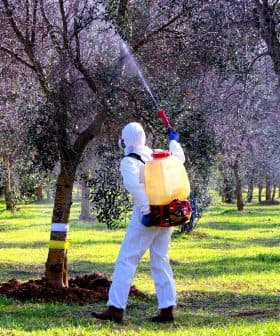Talking Olive Oil with Chat GPT
The artificial intelligence-powered chatbot demonstrates comprehensive knowledge of the olive oil industry and a capacity to provide precise information.
 5.5K reads
5.5K readsChatGPT, an artificial intelligence chatbot, has been trained to answer questions on a wide range of topics, including olive oil. It can provide detailed information about olive oil, including its health benefits, quality standards, and culinary uses. The chatbot also offers services to the olive oil industry, such as generating market reports, providing insights for marketing strategies, and translating documents into different languages.
Olive Oil Times had a conversation with ChatGPT, the newly released artificial intelligence chatbot that has taken the world by storm.
The bot was launched as a prototype to the public last November. It has been trained to assimilate diverse internet texts, including books, articles and website content, and can answer questions like a person.
ChatGPT has already made an impact in the scientific and academic worlds by exhibiting great ability in suggesting solutions to scientific problems, compiling computer code, writing emails and constructing essays on a range of subjects in great detail. We wanted to see what it knew about olive oil.
See Also:Researchers Use AI to Identify extra virgin olive oil ProvenanceThe conversation started with this reporter asking, “What are you exactly?” ChatGPT responded with the following:
“I am ChatGPT, a language model developed by OpenAI. I am trained on a large dataset of text and can generate human-like responses to prompts given to me.”
ChatGPT provides plausible answers to virtually any question, including all matters about olive oil.
When asked to share its knowledge on the topic, the chatbot provided a lengthy and highly informative reply:
Olive oil is a versatile and healthy oil made from the fruit of the olive tree. It is widely used in cooking and as a salad dressing. Olive oil is considered one of the healthiest oils, due to its high content of monounsaturated fats, particularly oleic acid, which is beneficial for heart health. It is also rich in antioxidants and has anti-inflammatory properties, making it beneficial for overall health.
Extra virgin olive oil is the highest quality olive oil, made from pure, cold-pressed olives, with no chemicals or solvents used in the extraction process. Virgin olive oil is also made from pure, cold-pressed olives, but may have slight defects in taste or aroma.
In the culinary world, olive oil is used in many dishes, such as salad dressings, marinades, sautéing, and as a finishing oil. It is also a key ingredient in Mediterranean and Middle Eastern cuisine.
Olive oil can be stored for about 18 – 24 months, in a cool, dry place, away from light and heat. It is important to note that Olive oil can become rancid if it is exposed to air, light, heat or high temperature which can affect its taste and quality.
The interview with ChatGPT continued by asking, “What makes a good olive oil?”

ChatGPT cranked out another comprehensive answer:
A good olive oil is characterized by its high quality, authenticity, and purity. Some key factors that determine the quality of olive oil include:
- Freshness: Fresh olive oil should have a fruity, green, and slightly bitter taste. The oil should not have any off-flavors or smells, such as musty, rancid, or metallic.
- Purity: A good olive oil should be pure and unadulterated, meaning it should not be mixed with other types of oil.
- Origin: The origin of the olive oil is important. The best olive oil is usually from a specific region, and it should be labeled as such.
- Chemical composition: Extra virgin olive oil should have a high level of antioxidants, polyphenols, and monounsaturated fats, which are beneficial for health.
- Quality Standards: Olive oil should be certified by a recognized authority such as International Olive Council (IOC) or USDA.
- Taste: The taste of olive oil is also an important factor, as good olive oil should have a fruity, green, and slightly bitter taste. The oil should not have any off-flavors or smells, such as musty, rancid, or metallic.
It’s important to note that a good olive oil is not just about the taste, but also about the health benefits and the authenticity of the product.
The chatbot can provide meaningful answers to all sorts of simple or complex questions, including creative ones.
When asked to create a motto for an olive oil-producing company, it responded:
Sure, here are a few different options:
1. ‘Bringing the taste of tradition to your table.‘
2. ‘Nature’s finest, from tree to bottle.‘
3. ‘Olive oil you can trust, from our family to yours.‘
4. ‘Pure, natural, and authentic olive oil.‘
5. ‘Quality in every drop.‘
6. ‘Pure essence of the Mediterranean’
7. ‘Experience the tradition of premium olive oil’
8. ‘Pure, authentic, and delicious olive oil’
Please keep in mind that a slogan or motto is a very important part of a brand, it should be simple, memorable, and unique to your company.
ChatGPT also provided useful cooking advice, especially when time and pantry supplies were limited.
When asked: “Can you suggest a recipe for a healthy dish using pasta and tomato?” the bot quickly provided a detailed recipe with cooking instructions.
Even when increasing the complexity of the questions, the chatbot experienced no difficulty providing an answer.
When asked whether olive trees can mitigate pollution, ChatGPT provided an answer consistent with a recent report in Olive Oil Times:
Olive trees have been studied for their potential to combat air pollution. They have been found to have a capacity to absorb and filter pollutants, including particulate matter, sulfur dioxide, and nitrogen oxides, from the air through their leaves and bark. Olive trees are also known to release oxygen and moisture into the air, which can help to improve air quality.
However, it’s important to note that while olive trees can help to improve air quality, they are not a replacement for other methods of reducing air pollution such as reducing emissions from power plants and factories, or promoting sustainable transportation. They can be considered as an additional method to improve air quality in urban areas, where they can be planted in streets, parks, and other public spaces.
In conclusion, olive trees can help to improve air quality, but they should not be considered as a solution to combat air pollution. It’s important to have a comprehensive and multi-faceted approach to address this complex issue.
ChatGPT was also adept at answering questions about olive oil milling, including malaxation (or kneading) of the olive paste, a critical stage of the extraction process.
When asked: “What is the right temperature for olive paste malaxation?” the chatbot worked out a reply which generally checks out.
The malaxation process is an important step in the production of olive oil, where the paste is mixed to allow the droplets of oil to fuse together and separate from the water and solids. The right temperature for malaxation is crucial to obtain the best oil quality.
The ideal temperature range for malaxation is between 25 – 27°C (77 – 81°F). If the temperature is too low, the malaxation process will be slow, and the oil will have a low yield and poor quality. If the temperature is too high, the malaxation process will be too fast, and the oil will have a high acidity and a poor taste.
It’s important to keep the temperature within this range, as it’s the optimal temperature for the enzymes to work and the cells to break down, in order to separate the oil droplets. It’s also important to note that malaxation time and temperature are closely related, if the temperature is high, the malaxation time should be shorter, and if the temperature is low, the malaxation time should be longer.
The chatbot is by no means a fortune teller. However, it also provided some intriguing answers when asked about the future trends in human dietary preferences and the olive oil industry.
When prompted: “Will people worldwide eat more healthily in the future?” it replied:
It is difficult to predict the specific changes in global dietary habits with certainty, but some trends that may shape food consumption in the future include increasing awareness of the link between diet and health, as well as the impact of climate change on food production.
Additionally, the growing popularity of plant-based diets and alternative proteins, such as soy, pea and hemp, may also increase. As people are becoming more health-conscious and environmentally aware, they may also seek out products that are sustainably produced, organic, and free from artificial ingredients.
It’s important to note that dietary habits are also influenced by social, cultural, economic, and political factors, and the dietary trends will vary across different regions and countries. It’s also possible that dietary habits may change as a result of new technologies, innovations in food production and distribution, and shifts in consumer preferences.
Overall, it is expected that people will continue to pay more attention to the quality and origin of the foods they consume and will look for healthier options, but it’s hard to say if a global trend will be established.
When asked: “What is the future of the global olive oil industry?”, it replied:
The future of the global olive oil industry will be influenced by a variety of factors, including consumer demand, production trends, and economic conditions. In recent years, there has been a growing demand for high-quality olive oil, driven in part by increased awareness of its health benefits. This trend is likely to continue in the future, which could lead to growth in the industry. Additionally, advances in technology and farming practices may improve production efficiency and quality, further boosting the industry.
However, the industry may also face challenges such as climate change, which can affect crop yields, and increased competition from other vegetable oils. These factors will likely play a role in shaping the future of the global olive oil industry.
It is difficult to predict the exact future of the industry, but it is likely to continue to evolve and grow in response to changing market conditions and consumer preferences.
By all accounts, ChatGPT is a breakthrough in the search for information. When faced with questions from the olive oil universe, this AI model demonstrated remarkable potential in maintaining a conversation and providing eerily accurate answers to all subjects presented to it in a manner similar to human communication.
Some tech experts expect artificial intelligence to utterly transform how people perceive information acquired from the world wide web.
“Very quickly, AI will make not only finding information (much easier) but understanding it – reshaping it and making it useful – much faster,” said Neil Voss, co-founder of augmented-reality startup Anima.
Others believe that such deep learning models are a mixed blessing, performing astonishingly well in a broad range of natural language tasks, such as automatic summarization and question-answering, but being prone to flaws. In some cases, the AI chatbot seems to buck industry trends, prevailing wisdom or real-market conditions.
When asked, “How ripe should olives be to make high-quality extra virgin olive oil?” the bot returned an answer that indicated a greater emphasis on yield than on shelf life and health benefits:
The ripeness of the olives is an important factor in determining the quality of the resulting extra virgin olive oil. In general, it is best to use ripe olives, as they contain the highest levels of oil and have the best flavor.
“ChatGPT and other [language models] may introduce unintended consequences and become a double-edged sword,” researchers from New York University wrote in a recent scientific paper published in RSNA journal.
There is also a disclaimer on the ChatGPT website about the chatbot sometimes writing “plausible-sounding but incorrect or nonsensical answers.”
Nevertheless, the chatbot could provide convincing answers to most of a reporter’s queries. The impact of such AI tools on different industries and business sectors, including the burgeoning world of olive oil, remains to be seen.
As a final challenge, when prompted with “Can you be of any service to the olive oil industry?”, ChatGPT replied:
Yes, as a language model AI, I can provide various services to the global olive oil industry, such as:
- Answering FAQs and providing information about the industry and its products.
- Generating market reports and analysis to help companies understand the latest trends and developments in the industry.
- Providing insights and recommendations for product marketing and branding strategies.
- Assisting in content creation for websites, brochures, and other promotional materials.
- Translating industry-related documents and communications into different languages.
Please let me know if you need further assistance.
Share this article









